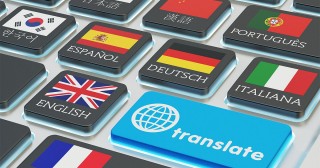The Celebrants Network Inc - BLOG
More Blog posts can be found in the Blog Categories to the right.
Why use a translator or an interpreter in Australia?
Are you getting married in Australia? Do you or your partner have limited English language skills? Are you or your partner hearing impaired? What about the two people you've chosen to be your official witnesses? Perhaps you have guests coming to your ceremony who don't understand English or are hearing impaired? There are a number of reasons why you might need to engage an interpreter or a translator when you are getting married....
If you are having a non legal ceremony, like a Baby Naming, a Vow Renewal or a Commitment Ceremony, and English is not your first language or that of your guests, your use of an interpreter is your choice and could be a thoughtful idea for your guests, so that they understand what is happening, however if you are having a legal Marriage Ceremony, and you or your partner or your witnesses are not proficient enough in the English language, then your celebrant may decide that the use of an interpreter and/or translator is necessary.
Section 112 of the Marriage Act 1961 provides that ‘where a celebrant considers it desirable to do so, they may use the services the services of an interpreter in or in connection with a marriage ceremony. ‘
What Does Section 112 of the Marriage Act (1961) Mean?
- If you as the Celebrant are only able to conduct a ceremony in English and if either of the couple or the official witnesses do not speak/understand English fluently, an interpreter will be required.
- The couple and witnesses MUST fully understand the legal components of the ceremony, which includes the Monitum and the legal vows.
- This includes ceremonies conducted in a sign language, such as Auslan.
- It is advisable to use an Interpreter, if either or both of the couple are hearing impaired.
- It is the responsibility of the Celebrant to decide if an Interpreter is required.
The Difference Between an Interpreter and a Translator
Interpreters and translators perform similar tasks, but in different settings. While an interpreter converts any spoken material from one language into a different language, as required in Wedding Ceremonies, a translator converts written material in the same manner, as required in the use of legal documents in relation to marriage. ![]()
How do I obtain a translator or interpreter?
The National Accreditation Authority for Translators and Interpreters Ltd (NAATI) is the national standards and accreditation body for translators and interpreters in Australia. The NAATI website provides a searchable online directory of translators and interpreters. If the services of a translator or interpreter are required, the Attorney General's Department recommends that they are found through the NAATI website and that the translator or interpreter is accredited at Level 3 or higher.
Who can be an Interpreter?
- Where possible, it is best that the interpreter be an accredited interpreter through the NAATI, please visit: http://www.naati.com.au/
- It is recommended that the interpreter not be one of the two official witnesses. The roles of the two witnesses are to observe that the marriage is duly solemnised and to sign the marriage certificates.
- Where a family member or friend is used as an Interpreter the Celebrant must be confident that he/she is doing the job properly in order to ensure the marriage is validly solemnised.
- The Interpreter must provide a Statutory Declaration, prior to the wedding, stating their fluency in the relevant language. This must be witnessed by the Celebrant.
- Immediately after the ceremony the Interpreter must provide a Certificate of Faithful performance of his or her services. This must be witnessed by the Celebrant. The certificate must be in the approved form which is available on the Attorney-General’s Department’s website.
Subsection 50(4) of the Marriage Act (1961) requires the celebrant to forward the official certificate of marriage and the NOIM (together with supporting documents, the statutory declaration and certificate of faithful performance by the interpreter) to the BDM in the state or territory in which the marriage was solemnised. ![]()
Who can be a Translator?
- Your celebrant must be satisfied that the translation is a true and accurate translation of an official document through NAATI or another official agency. If you need a certified translation, please visit: http://www.naati.com.au/
- When a party to a marriage produces a document in a language other than English, the celebrant (even if they can read and write in that language) should ask the couple to seek an official NAATI certified translation of the document.
- The Marriage Regulations do not require translations to be provided by an accredited translator, except where a person consenting to a minor’s marriage gives a consent that is not in English.
Marriage documents form part of a chain of documents a person will use over the course of their life to establish their identity and obtain identity documents. Obtaining an accredited translation will provide an audit trail of amendments to a person’s record, preserving a party’s name in full (especially where documents contain non-alphabetic characters).
If you are unsure about your need to use a translator or an interpreter, you may contact The Celebrants Network or the Marriage Law and Celebrant Section of the Australian government for more information.
By accepting you will be accessing a service provided by a third-party external to https://www.celebrants.org.au/


Comments